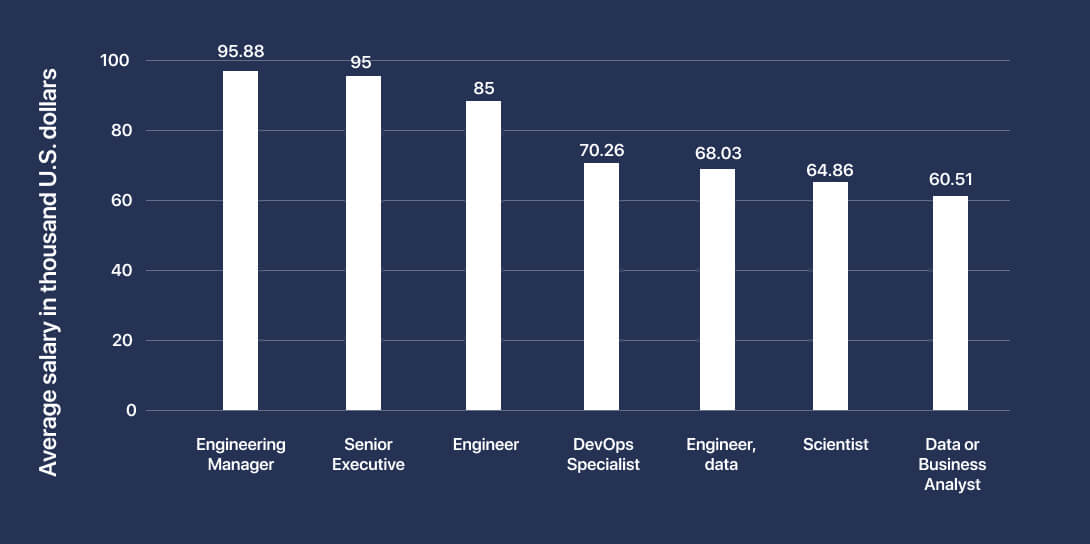- What is Software Engineering, and what does a software engineer do?
- Different Types of Careers in Software Engineering
- How do I become a software engineer?
- What Programming Languages Should You Focus on to Become a Software Engineer?
-
What is the average time it takes to become a software engineer?
-
How Much Can You Make as a Software Engineer?
-
Summary
- FAQs
Software engineering is a constantly evolving field. If properly understood and applied, technology can solve many issues. Software engineers have transformed the digital world. There are many alternative entry points into the software field because new technologies are invented every day. Software engineering is one of the highest-paying jobs, but it needs perseverance, continual learning, and progress.
Software engineers conduct research, design, and code in one of several programming languages to create applications or apps for personal and corporate computers. Due to the growing technology, there is a continuing need for more software engineers. Now is an excellent time if you’ve ever considered to become a Software Engineer. Software engineers will always be needed as long as there is a need for new technology.
When we embark on a new endeavor, questions such as what do software engineers do, and numerous doubts occur. Let’s talk about various possibilities and a path that can help you become a programmer, but keep in mind that there is no one-size-fits-all approach to becoming a software engineer.
What is Software Engineering, and what does a software engineer do?
The first question that comes to mind is, what is precisely software engineering? It’s the method for developing software. The principles, tools, and techniques utilized in professional software development are referred to as software engineering. Concept creation, implementation, and deployment are all steps included in the software development process. Updates and maintenance of software are part of evolution.
The other question that comes across is, what do software engineers do? Software engineers steer applications through their development and evolution. Software engineers are also referred to as software developers who design, create and deploy software. A job as a software engineer could be gratifying if you’re a problem-solver who appreciates making digital things easier to use.
Successful engineers know how to use the correct programming languages, platforms, and architectures, from computer games to network management systems. Software engineers test, improve, and maintain software created by other engineers in addition to designing their own systems.
Some daily tasks of a software engineer:
- Software system design and maintenance
- Supervising systems
- New software packages are evaluated and tested.
- Increasing the speed and scalability of software
- Code creation and testing
- Consulting clients, engineers, security experts, and other stakeholders
- Collaborating with coworkers
Different Types of Careers in Software Engineering
A software engineer’s job is varied and difficult, needing hard and soft talents that differ by industry. Often software engineers and software developers are mistaken to be the same profiles as they also rely on each other for many tasks. As a result, both titles are included below while discussing the different types of software engineering jobs.
Mobile Developer
Mobile developers build code for apps that are meant to operate on mobile devices like smartphones and tablets. If you enjoy working with mobile platforms and converting code into user-friendly apps, this software engineering career option is apt for you. Mobile app developers work in popular operating system environments like iOS and Android in order to create mobile applications.
DevOps Engineer
This is the most in-demand career option in software engineering. Engineers who work in DevOps use methods and methodologies to streamline product development, enhancement, maintenance, and communication between development and operations teams. DevOps engineers are among the highest-paid IT professionals today, with companies like Accenture, Barclays, and Facebook continually on the hunt for qualified candidates.
Front-end Engineer
A front-end engineer, often known as a website developer, specializes in creating user interface (UI) designs for the application. The engineers require knowledge of visual design aspects, such as layout and aesthetics, as well as a solid understanding of how people interact with and use computer programs. To ensure cross-browser compatibility, they must also be familiar with code that runs on many operating systems, browsers, and user devices.
Front-end developers are required to collaborate with back-end developers, visual designers, and user experience designers to ensure that all aspects of web development are consistent. This requires outstanding interpersonal and communication skills. As a result, if you have good communication abilities and computer engineering knowledge, you should consider it.
Back-end Engineer
Back-end engineers help build websites using advanced technologies. Back-end engineers assist with designing and developing web applications and their maintainability and best practices in a large-scale web environment. This professional path attracts people who enjoy coding and have a basic understanding of programming concepts.
A back-end engineer, often known as a back-end developer, works on complicated systems to produce seamless functions behind the user interface, concentrating on the system’s basic logic, design, implementation, scalability, and performance. Their basic tasks include using Application Programming Interfaces; they primarily develop and administer databases and integrate data systems, log systems, and cache systems (APIs).
Full-stack Developer
A full-stack developer can manage a “full stack” of development technologies and is proficient in both front-end and back-end coding disciplines. As the front-end and the back-end complete the application, a full-stack developer takes care of all aspects of an application. They design and build from scratch. They have a thorough understanding of both front and back end architectural principles and command of a variety of programming languages, including HTML, CSS, and JavaScript for the front end, as well as Python, Java, and R. It is indeed a promising career option.
Data scientist
A data scientist is essentially a part mathematician, part computer scientist, and part business trend scout who can work in both the IT and business worlds. Data science careers are on the rise, with numerous openings across a variety of industries. Organizations are employing hundreds of data scientists as more and more companies adopt data science. Data engineers, Data analysts, and Business Intelligence developers are all considered under the Data Scientist profile. This gives a wider prospect to your career.
Software Integration Engineer
A software integration engineer is a programmer that focuses on developing software applications that integrate with numerous platforms. One can work as a software integration engineer even if one wants. Most software integration engineers begin their careers as software engineers before moving into the domain of software integration.
Application Developer
Coding, designing, application management, debugging, monitoring updates and potential security risks, and providing end-user assistance are typical of an application developer. On the way to developing a new application, they may also be in charge of some project management activities. Application developers are expected to build and maintain various organizations’ web and mobile applications. Overall they work on the development process and keep advancing the application development.
QA Engineer
Quality assurance is becoming a popular career option for many people due to the rapidly increasing quantity of resources and demand in the business. QA Engineer participates in and monitors every aspect of the software development lifecycle. They aid in improving development processes to assure the delivery of a high-quality product. The majority of QA Engineer activities are process-oriented, and thus to streamline a software development process, QA engineers are always needed.
Blockchain Engineer
The Blockchain Engineer has different tasks and responsibilities depending on the enterprise or organization. Knowing what technical abilities are necessary is also important because it can help you develop your skills when applying for a specific job. Always remember to look over the Blockchain Engineer job posting’s required skill set. If you lack any important abilities, work on developing them and applying them appropriately. High pay and job advancement because blockchain is the future and has yet to be fully explored.

How do I become a software engineer?
As we’ve seen, there are a variety of job paths to select from and factors to consider before embarking on a new journey, but you may still be unsure where to begin. So further, we will be discussing a general path that will help you break into the software engineering business.
Pursuing a degree
One of our primary rules has been to obtain a degree in the related field in which we wish to pursue a profession. A degree clears all your basic as well as advanced concepts related to computers. Data Structures, Algorithms, Web Technology, Computer Networks, Mathematics, Database Systems, Programming Languages, and a variety of other significant courses assist students in gaining a thorough understanding of software engineering. To become a software developer or engineer, you must apply your theoretical knowledge and principles to real-world software. A degree or, rather, we would say, a study in a specific field can help you with your career.
Programming languages
The next thing you need to know is the programming languages. We communicate with each other in our languages the same way computer programs communicate. So to be a software engineer, you need to learn how they connect, and excelling in programming language might help. Gain a deeper understanding of Ruby, Java, Python, C++, C#, Javascript, and various other programming languages.
Learn data structures and algorithms
A software engineer is supposed to provide the best solution for a given problem while taking into account both time and memory constraints. In the case of data structures and algorithms, they go hand in hand. The data structure is the method of arranging data, whereas an algorithm is a step-by-step technique for solving a given problem. These two approaches assist programmers in solving problems in less time and memory. You can work on it and learn how these two fundamental building blocks in software are used to solve problems in the real world or industries.
Upgrade your skills
Upgrading your skills is a never-ending process. Never stop learning, even if you are good at it. The same is the case with programming. Keep practicing your programming skills and learn new ones according to the advancement taking place. While getting a degree might help you comprehend the fundamentals of software engineering, you should also know how to use academic information in the actual world. You should be familiar with some of the software development tools and techniques utilized in the workplace.
Build a portfolio
Companies require you to see if you have practical knowledge along with theoretical knowledge. You should be able to apply the ideas and concepts you’ve learned to create some incredible applications. It’s pointless to master all the theoretical notions if you don’t know how to apply them. So, put everything you’ve learned to good use and develop your talents by creating software or projects. Try and work on some projects which can show your work. Also, taking up internships with companies will help you through your projects. A potential employer will be able to see your talents and experience.
Start job hunting and build network
Now you have it all; you have a degree, basic skills, and all required to become a software engineer. Wait! There is still something left. Prepare a resume, create a professional profile on various job portals, upload your resume, visit these sites regularly, and apply for employment. With all of this, you might be able to search for jobs, but how will you secure them?
Saying this, building your network in the industry is also important. Make connections, meet people, attend meetups, conferences, and seminars and expand your network. This way, your contacts will help you with recommendations. And this is how you become a software engineer.
What Programming Languages Should You Focus on to Become a Software Engineer?
Every programming language is unique in its own way. Every organization desires a programmer and all-rounder who is capable of writing both simple scripts and complex applications. In fact, learning more than one language is almost a requirement. Here is our list of 5 programming languages that any programmer or software developer should aim to master.
C Programming
- C is considered to be the core of all programming languages.
- A-C program’s execution time is quick, and its syntax is straightforward.
- As one of the principal languages for embedded programming, the C programming language can be used to control the operation of hardware.
- Due to its versatility, it is platform-independent. C allows you to code or program various forms of hardware, such as robots and other electronic equipment.
- It is a fast and efficient programming language.
Java
- Java is one of the most popular programming languages due to its written once and run anywhere type of approach.
- Java is an object-oriented programming language. However, it is not regarded as true object-oriented because it supports basic data types (like int, char, etc.).
- Java is used in a wide range of applications, including mobile apps, desktop apps, online apps, client-server apps, enterprise apps, and many others.
- The syntax of Java is similar to C/C++. Java, on the other hand, does not support low-level programming.
- The most appealing reason to learn Java is that it is easy to learn.
Python
- Python is well-known for its robustness, scalability, and extendable visualization and graphics capabilities.
- It has a simple syntax and the support of several machine learning libraries, which makes it a preferred language.
- Python includes many frameworks that make it considerably easier for developers to create web apps.
- It includes various built-in testing frameworks that aid in debugging and accelerating the workflows.
- Python has a large community to assist you with programming problems or software concerns.
JavaScript
- JavaScript has been the dominant programming language for software development.
- It can be used for both client-side scripting as well as for user interface development with the help of frameworks and libraries like Node JS, Angular, and React.
- JavaScript is the internet’s default language, and you can execute and test your code in the browser. There is no need to create a unique development environment or any form of configuration in your text editor.
- It can be used in practically any field, from the most basic to the most complicated, making it more adaptable.
- Because of the large number of applications for this language, JavaScript developers are in high demand. This makes it more important to learn JavaScript.
Scala
- Scala offers various advantages, the most notable of which is its multi-paradigm language.
- Scala runs on the Java Virtual Machine (JVM) and works well with Java programming. Scala developers can thus use Java libraries directly from Scala programs.
- The finest of both worlds is Scala. Although it appears to be dynamic, the languages are largely statically typed.
- Scala features a plethora of useful libraries and frameworks, as well as a growing number of enterprises that use it, which are also contributing to the recent growth.
- Scala has set a new standard for being both concise and readable.
What is the average time it takes to become a software engineer?
Some might have a degree in computer science, and some might have experienced, and some not. Considering all of these, an average time to become a software engineer would be calculated. Suppose you have a four-year degree but no coding expertise. In that case, there are various coding programs and tools available to enable people without a background in technology to learn to code. Some might want to direct their career toward software engineering but might not have a suitable degree. Thus, for them, there are courses available.
Students pursuing a formal programming education and those seeking to learn the fundamentals of software development on their own should devote personal time to programming projects. Taking all of this into account, and depending on your technical skills, professional history, and career path, becoming a Software Engineer could take anywhere between three and four years.
How Much Can You Make as a Software Engineer?
Over the past few years, there has been a drastic shift in people opting for jobs as software engineers. Software engineering is expected to be one of India’s most high-paying careers. We use software developers’ hard work every time we use our phones or computers to access a website or use an app. As a result, software engineers are in high demand, and the occupations are well-paying. As of 2021, the engineering manager is the highest-paying software development position in the world, with an average yearly income of roughly 98,980 USD.

(Source: Statista.com)
Summary
To sum up, Software engineering is evaluating user needs, then designing, creating, and testing software to meet those requirements. One of the most effective ways to learn how to become a software engineer is to expand your skillset by taking software engineering classes. The next step is to concentrate on your résumé which is critical to your hiring success.

FAQs
Is it possible to become a software engineer without a degree?
For those with the necessary expertise, the discipline of computer science offers a multitude of professional opportunities. If you have the necessary coding talents, you can get work as a software engineer without a degree.
What is the starting salary of a software engineer?
Several factors influence the average software engineer salaries. Each country has a different pay scale according to the level of Software Engineers.
- Switzerland – $82,878
- Norway – $71,993
- Denmark – $70,407
- Israel – $64,198
How Is Software Engineering Different From Web Development?
Software engineering refers to the construction of computer systems and the software related to it, as well as the broad application of software engineering concepts. On the other hand, web developers concentrate on the design of web pages as well as the continuing maintenance of their back-end data and overall usability.
What are the skills needed to be a software engineer?
A professional software engineer has the following skills:
- The ability to understand complex technological data
- Excellent research skills
- A fantastic problem solver.
- Experience of working on software apps








